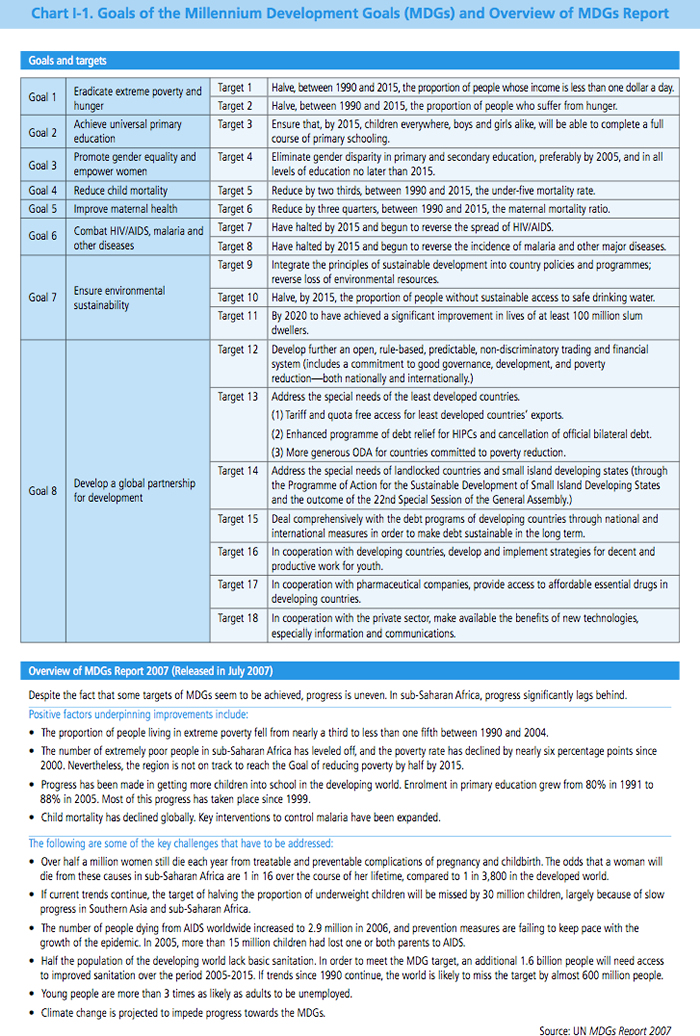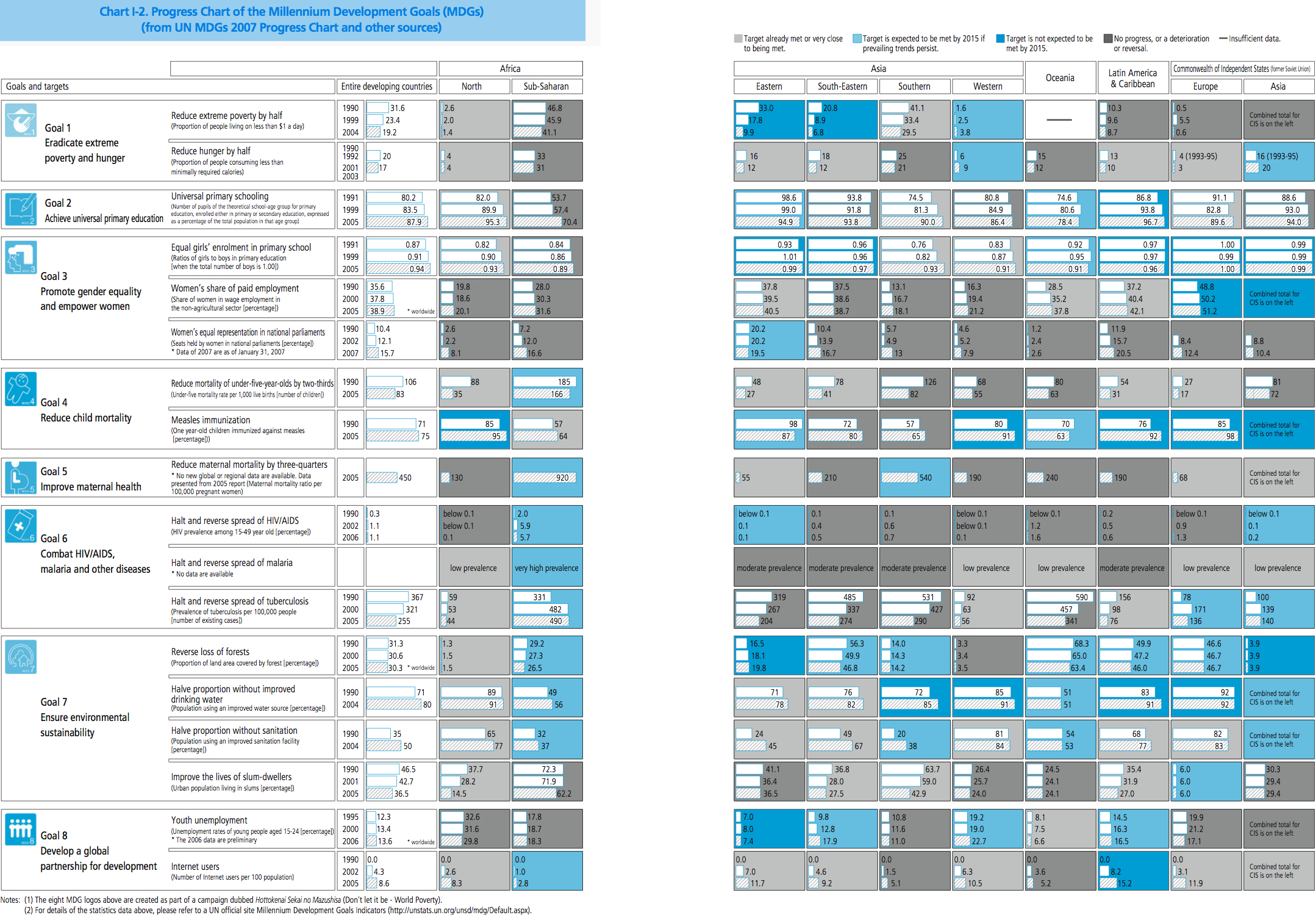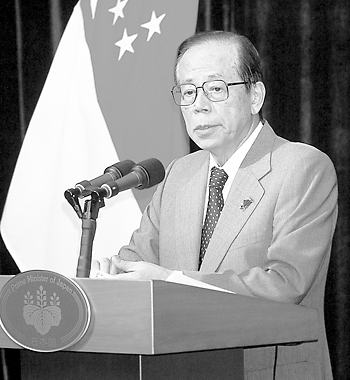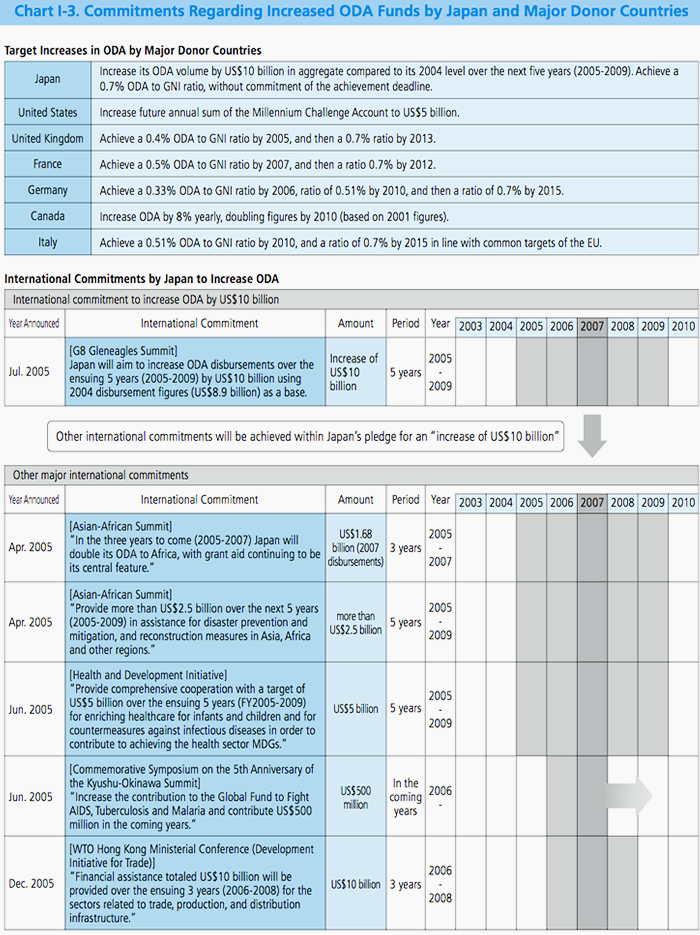Japan's Official Development Assistance White Paper 2007
Main Text > Part I JAPAN'S OFFICIAL DEVELOPMENT ASSISTANCE IN ITS TRANSITION PERIOD > Chapter 1 The Contemporary Role of International Cooperation > Section 1. Fundamental Significance of International Cooperation
Section 1. Fundamental Significance of International Cooperation
1. The Mission of Japanese International Cooperation
Why does Japan provide assistance to developing countries?
Japan has constructed an affluent society through economic prosperity and democracy that realizes peace and happiness for its people.
Meanwhile, the world currently faces a mountain of challenges, including those related to humanitarian issues such as extreme poverty, famine, refugees and disasters; environmental issues such as climate change; and other global issues such as infectious diseases and terrorism. It is the responsibility of Japan, as the second biggest economic power in the world, which accomplished its affluent society, to tackle these challenging issues of global nature.
In this global community, Japan is not generating its current affluence solely for itself. The interests of Japan will be directly threatened if humanitarian issues and global issues are neglected. Japan enjoys the beneficence of free trade and depends largely on other countries for its natural resources including energy and food. It is necessary that Japan pursues its prosperity and stability through global interdependency.
Contributing to the peace and development of the international Community through the provision of assistance to developing countries will lead to an increase of trust in Japan and its people, and, as a result, will contribute to ensuring Japan's security and prosperity.1
2. Progress on the Millennium Development Goals (MDGs)
Various demands for aid exist in the world, and there are many issues that should be addressed proactively by developed nations as responsible partners. Poverty reduction and the economic growth of developing countries are at the core of development agenda. Furthermore, people in adverse situations such as poverty are more likely to be affected by global issues like environmental ones, including global warming; infectious diseases; disasters; and regional conflicts.
The international community has established the Millennium Development Goals (MDGs) and has been working on development issues for those in need. Japan played a leading role in creating the MDGs.2 MDGs identify eight goals including eradicating extreme poverty, achieving universal primary education, reducing child mortality, improving maternal health and ensuring environmental sustainability. Specific numerical indicators were assigned to each goal with an overall deadline of 2015. The Millennium Development Goals Report 2007 warned of a delay in the achievement of the MDGs due to a lag in development in Sub-Saharan Africa and issues related to climate change.
Chart I-1. Goals of the Millennium Development Goals (MDGs) and Overview of MDGs Report

Chart I-2. Progress chart of the Millennium Development Goals (MDGs) (from UN MDGs 2007 Progress Chart and other sources)

3. The Fourth Tokyo International Conference on African Development (TICAD IV) and the G8 Hokkaido Toyako Summit
2008 is a highly important year for Japan, as it will host both the Fourth Tokyo International Conference on African Development (TICAD IV) and the G8 Summit. At TICAD IV, Japan will face the challenge of harnessing the wisdom and resources of the international community for the development of Africa. At the G8 Hokkaido Toyako Summit, Japan, as chair, is expected to show its leadership in the efforts to tackle various issues which the international community faces, including, most notably, climate change. Assisting developing nations through Official Development Assistance (ODA) is important in addressing global issues such as the issue of climate change. Furthermore, the G8 Development Ministers' Meeting will be held in April 2008 preceding the G8 Hokkaido Toyako Summit. In 2008, Japan's leadership in the field of development will be called for.

Prime Minister Yasuo Fukuda holding a conference for domestic and foreign press at the East Asian Summit in November 2007 (Photo: the Cabinet Public Relations Office)
4. Priorities for Japanese International Cooperation
At present, Japan will focus on addressing the following priorities in implementing international cooperation:
1) Addressing environmental and climate change issues
2) Realizing economic growth of developing countries and furthering economic prosperity in Japan
3) Setting democratization and assisting market-oriented economic reform
4) Peacebuilding and the fight against terrorism
5) Ensuring human security
(From the "Priority Policy and Regional Priority Issues for International Cooperation in FY2007," which was formulated by the Ministry of Foreign Affairs in consideration of discussion by the Overseas Economic Cooperation Council).3
(1) Addressing Environmental and Climate Change Issues
Global warming is the most urgent issue that human beings are facing. The people of the least developed countries, who bear least responsibility for greenhouse gas emissions, are the most vulnerable to the changes incited by global warming. This fact suggests that the countries responsible for large emissions must take the initiative in addressing the issue. Japan proactively engages itself in establishing an effective international framework for counteracting climate change. Japan regards it as important that all major emitter countries be involved in an effective framework. It also places importance on achieving both environmental conservation and economic growth by utilizing technology such as energy conservation, in which Japan has an advantage. Japan will strategically utilize official aid to this end. At the same time, Japan will provide assistance for reducing greenhouse gas emissions, preserving forests, supporting adaptation measures for regions easily affected by global warming, and for promoting access to clean energy.
See Section 3 for details
(2) Realizing Economic Growth of Developing Countries and Furthering Economic Prosperity in Japan
It is important to consider the perspective of realizing Japan's economic prosperity through utilizing official aid and contributing to the economic growth of developing countries. Japan is reliant on foreign countries, from which it imports many of its resources and food. It is therefore important that Japan works towards maintaining an international environment that allows for the stable supply of resources and an international economic system that facilitates the export of Japanese products and the activities of its companies.
A new structural change in the economic structure has been noteworthy in recent years, as emerging countries such as China and India have gained power through their significant economic growth. Given these circumstances, emphasis is being placed on utilizing official aid in order to secure a foundation for Japan's economic prosperity. It is also important to utilize official aid and provide assistance for the natural resource and energy development projects undertaken in developing countries by Japanese private corporations. Meanwhile, Economic Partnership Agreements (EPAs) with Mexico, Malaysia, Chile, Thailand, the Philippines and Indonesia,4 have entered into force or have been signed. Japan is currently conducting negotiations with countries such as Viet Nam and India. Cooperation through official aid is being expected in fields including human resources development and assistance for small and medium-sized enterprises in order to promote economic partnership with these countries.
See Section 2 for details
(3) Settling Democratization and Assisting Market-Oriented Economic Reform
One reason for Japan's current affluence are the nurtured "universal values" of freedom, democracy, basic human rights, the rule of law, and a market economy. Japan will strengthen dialogue with countries, facilitating democratization and market-oriented economic reform while continuing to promote assistance for basic human needs, infrastructure development, democratization, market-oriented economic reform, and legal and judicial system development in accordance with each country's stage of development.
See Chapter 2, Section 2 for details
In November 2006, then Foreign Minister Taro Aso clarified this policy in his policy speech "Arc of Freedom and Prosperity: Japan's Expanding Diplomatic Horizons."5
(4) Peacebuilding and the Fight against Terrorism
Conflict and terrorism are a direct threat to individual lives. Armed conflicts that produce large numbers of refugees and displaced persons are a grave threat to human security, and induce instantaneous losses of development efforts conducted over many years and massive economic loss. Terrorism is a global issue that transcends national borders and directly affects not only developing countries, but also the entire international community. Japan's policy is to support the response to humanitarian emergencies and to provide counter-terrorism capacity building assistance, as well as address projects that contribute to consolidation of peace and post-conflict nation building, including disarmament, demobilization, and reintegration (DDR) of former soldiers, the collection of small arms, demining and related activities, and improving governance. Japan will thus contribute to peace building and the fight against terrorism.
See Part II "Terrorism and Piracy" and "Peacebuilding" for details
(5) Ensuring Human Security All humans possess the right to live a healthy, fulfilling life with dignity, no matter what country or region they were born in. It is thus important not only to protect the people of developing countries that directly face various threats, but also to increase their capabilities to a sufficient level to handle those threats by themselves. Based on this idea, Japan assumed a leading role in the international arena by making human security a vital component of development assistance, and established the Trust Fund for Human Security within the United Nations. Japan will work to ensure human security through such activities as strengthening regional communities in developing countries.
See Chapter 2, Section 3 for details
5. Forming Diplomatic Infrastructure
In this way, Japan's efforts to improve the economic society of developing nations and to address urgent global issues as so demanded by the times will improve how Japan is evaluated in the international community and, as a result, create a strong diplomatic infrastructure.
(1) Japanese International Cooperation Promoted by a Wide Range of Parties
In providing assistance, Japan emphasizes having Japanese people work closely together with the locals on-site in developing nations, based on the idea that human resource development is the foundation for nation building. Currently, 7,895 experts6 are providing technical cooperation in developing nations. These experts possess high-level professional awareness within the field of cooperation, and have refined their technical strength while accumulating daily experience and practice to show unparalleled leadership within developing nations. Currently, 4,407 Japan Overseas Cooperation Volunteers7 and 1,212 Senior Cooperation Expert7 have been dispatched to work together with locals and are enthusiastically conducting activities utilizing their own experience. Moreover, Japan is currently accepting 41,725 trainees.8 Cooperation involves many organizations including large, medium, and small private enterprises, universities, and research institutes, as well as the public institutions and local governments.
In the event that a Japanese corporation accepts an order for a loan aid or grant aid project, many Japanese − including supervisors and engineers associated with the project − assist with the implementation of the project.
In addition, now more than 400 Japanese NGOs conduct activities throughout the world, and 163 of those NGOs9 currently use government funds to provide grassroots assistance in developing countries. Japanese NGOs are important partners of Japanese international cooperation activities because they play a leading role at the grassroots level. Furthermore, advisors from consulting firms are active during the formation phase of ODA projects, and academics and members of the public contribute to the project evaluations. In this way, Japanese assistance is employed with the valuable efforts of a wide range of Japanese participants. Many of the Japanese that participate in the implementation of economic cooperation live and work together with their counterparts and residents of developing countries while they carry out their projects. When facing a problem, they discuss the issue with the local people and search for the optimal solution until everyone is satisfied. Once, Japanese international cooperation was criticized for lacking sufficient human contributions; this conception, however, is inaccurate as Japan has undertaken international cooperation projects in which Japanese themselves work on the project site.

Training at a hospital in Takatsuki City (Photo: Kenshiro Imamura/JICA)
(2) Japanese Methods Supported by the World
Furthermore, the Japanese working on-site in developing countries have continuously cultivated the sense of value in working, and this has been one of the contributions passed on to developing countries. Untiring efforts to improve quality and the work process, the user-first principle, adhering to time restraints and commitments, and consideration for safety and environment have all been passed on to developing countries to stimulate a transformation of consciousness and, in some cases, have been taken as a new standard.
For example, the subway (Delhi Metro) used by 600,000 people a day in Delhi, India was constructed using a loan aid beginning in FY1996. Through this assistance, Japanese technical expertise conveyed the idea of security efforts on the construction site and methods for managing the construction schedule. The Japanese term nouki (deadline) is now used by the people associated with the subway in India.
See Column 4 for details
In a Japanese organization, daily improvements are being made through meetings in which workers participate. This method of improvement is also being accepted in developing countries. For example, individuals taking the business courses at the Human Resource Development Center for International Cooperation (Japan Center) in Mongolia, which is the base for Japanese technical cooperation, have independently established the Kaizen Association in order to promote the improvement of corporations. The Kaizen Association is a success, and its results include tangible sales increases and the development of new products.10 Many other methods and ideas from Japan such as "5S" (sort, straighten, shine, systemize, and sustain) and koshuu (public health) have been received by developing countries along with the Japanese terminology.11
This accumulation has created trust and friendliness towards Japan, and is a great asset for Japanese diplomacy. In other words, Japan is formulating a desirable international environment through international cooperation centered on official aid. Japan's methods for international cooperation are limited even amongst developed countries. For example, the total number of personnel dispatched from the G8 countries for UN peacekeeping operations (PKO) exceeds 6,600; the number of personnel dispatched from Japan under the PKO law, however, does not surpass 53. The role of official aid in supporting Japanese diplomacy is thus all the more important.
Column 1 Japan Overseas Cooperation Volunteers (JOCV)
Building a Feeling of Friendliness towards Japan in Mongolia
2007 marks the 35th anniversary of the establishment of diplomatic relations with Mongolia. As part of "The Year of Japan in Mongolia," various festivities are being held in Mongolia that represent the friendly relationship between the countries. Japan has consistently provided assistance to Mongolia since the beginning of the 1990s, when democratization and market-oriented economic reform began in the country. For instance, for a period of 15 years, through grant aid, technical cooperation and loan aid, Japan performed repairs and improved the operation of the 4th Thermal Power Plant in Ulaanbaatar, one of the most substantial facilities for electric power supply in the capital. As a result, in addition to the efficient use of the facilities, the level of management and technology markedly improved and the power plant was operated more efficiently. This stable electric power supply contributed significantly to improving people's livelihood and reducing air pollution. Dispatching Japanese experts and Senior Volunteers over the course of many years fostered feelings of respect and friendship toward Japan among the staff of the 4th Thermal Power Plant. After the 2004 Niigata Prefecture Chuetsu Earthquake, all workers of the 4th Thermal Power Plant attended work despite it being a holiday, and contributed all of their earnings for said work to the disaster victims. The Government of Mongolia also opened a charity account and collected contributions widely from the general public. After the Great Hanshin Earthquake in 1995, there was also an occasion when the then Mongolian Vice Prime Minister rushed to Kansai International Airport on a special airplane full of blankets and gloves for the earthquake victims. He returned to Mongolia shortly after delivering the relief supplies as he did not want to cause any inconvenience for the Japanese authorities in the aftermath of the disaster. In this way, relationships of trust with developing countries created through international cooperation are strengthening the foundation of Japan's diplomacy.

Senior volunteers at the 4th Thermal Power Station (Photo: Kenshiro Imamura/JICA)
2007 marks the 35th anniversary of the establishment of diplomatic relations with Mongolia. As part of "The Year of Japan in Mongolia," various festivities are being held in Mongolia that represent the friendly relationship between the countries. Japan has consistently provided assistance to Mongolia since the beginning of the 1990s, when democratization and market-oriented economic reform began in the country. For instance, for a period of 15 years, through grant aid, technical cooperation and loan aid, Japan performed repairs and improved the operation of the 4th Thermal Power Plant in Ulaanbaatar, one of the most substantial facilities for electric power supply in the capital. As a result, in addition to the efficient use of the facilities, the level of management and technology markedly improved and the power plant was operated more efficiently. This stable electric power supply contributed significantly to improving people's livelihood and reducing air pollution. Dispatching Japanese experts and Senior Volunteers over the course of many years fostered feelings of respect and friendship toward Japan among the staff of the 4th Thermal Power Plant. After the 2004 Niigata Prefecture Chuetsu Earthquake, all workers of the 4th Thermal Power Plant attended work despite it being a holiday, and contributed all of their earnings for said work to the disaster victims. The Government of Mongolia also opened a charity account and collected contributions widely from the general public. After the Great Hanshin Earthquake in 1995, there was also an occasion when the then Mongolian Vice Prime Minister rushed to Kansai International Airport on a special airplane full of blankets and gloves for the earthquake victims. He returned to Mongolia shortly after delivering the relief supplies as he did not want to cause any inconvenience for the Japanese authorities in the aftermath of the disaster. In this way, relationships of trust with developing countries created through international cooperation are strengthening the foundation of Japan's diplomacy.

Senior volunteers at the 4th Thermal Power Station (Photo: Kenshiro Imamura/JICA)
Youth Exchange and Accepting Foreign Students
When laying the diplomatic foundation, it is important to enhance people-to-people exchange between countries in order to promote mutual understanding, and to develop a feeling of friendship towards Japan. Taking this view, Japan has actively been promoting youth exchange and receiving foreign students, who will bear responsibilities in the future. In January 2007, at the East Asia Summit (EAS), then Prime Minister Shinzo Abe announced a plan to "implement a youth exchange project amounting to ¥35 billion under which Japan would invite around 6,000 youths mainly from EAS member countries annually over the next five years" (JENESYS Programme).12 Via this programme, a total of approximately 4,800 youths (middle school, high school and university students) will be invited to Japan in FY2007, including approximately 2,000 from China, 1,200 from the Republic of Korea, 800 from ASEAN countries, and 200 from India. In addition, approximately 300 Japanese youths will be dispatched from Japan to the Republic of Korea.13 As for receiving foreign students, Japan is accepting the Japanese Government Scholarship students currently and also providing assistance to privately-financed foreign students through various instruments (programs to promote the exchange of students,14 Japanese Grant Aid for Human Resource Development Scholarship,15 Japanese ODA Loans for Exchange Students,16 and the United Nations University Financial Assistance Programme for Students from Developing Countries).17
When laying the diplomatic foundation, it is important to enhance people-to-people exchange between countries in order to promote mutual understanding, and to develop a feeling of friendship towards Japan. Taking this view, Japan has actively been promoting youth exchange and receiving foreign students, who will bear responsibilities in the future. In January 2007, at the East Asia Summit (EAS), then Prime Minister Shinzo Abe announced a plan to "implement a youth exchange project amounting to ¥35 billion under which Japan would invite around 6,000 youths mainly from EAS member countries annually over the next five years" (JENESYS Programme).12 Via this programme, a total of approximately 4,800 youths (middle school, high school and university students) will be invited to Japan in FY2007, including approximately 2,000 from China, 1,200 from the Republic of Korea, 800 from ASEAN countries, and 200 from India. In addition, approximately 300 Japanese youths will be dispatched from Japan to the Republic of Korea.13 As for receiving foreign students, Japan is accepting the Japanese Government Scholarship students currently and also providing assistance to privately-financed foreign students through various instruments (programs to promote the exchange of students,14 Japanese Grant Aid for Human Resource Development Scholarship,15 Japanese ODA Loans for Exchange Students,16 and the United Nations University Financial Assistance Programme for Students from Developing Countries).17
6. The Recent Situation of Japan's ODA Budget
ODA is a vital means of international cooperation for Japan to pursue prosperity and stability through interdependent relationships within the international community. The international community is currently working to counter challenges common to all humanity. In order for Japan to conduct cooperation that will obtain sufficient trust from the international community and for Japan to pursue national interests itself, it is important that Japan secure an amount of assistance proportionate to that level.
In recent years, since the simultaneous terrorist attacks in the United States in 2001, the major aid-providing countries of the world have taken a perspective of international crisis control, and have increased development funds based on the idea that poverty is a breeding ground for terrorism. On the other hand, the budget for Japanese ODA is in decline18 as a result of fiscal reconstruction efforts19 by the government.
In the Basic Policies for Economic and Fiscal Management and Structural Reform 2006 approved by the Cabinet in July 2006, it was decided to reduce the ODA budget by 2-4% compared with the previous year as a five-year expenditure reform beginning in FY2007. In response to this, the FY2007 ODA budget (general accounting) was reduced by 4% compared with the previous fiscal year. As for disbursements for 2006, the net amount of ODA disbursements decreased by 14.9% on the previous year to total US$11.19 billion, ranking just below the United Kingdom at third.20 Gross disbursements totaled US$17.12 billion ranking second.21 Just as noted in the aforementioned 2006 Basic Policies, Japan will unfailingly fulfill its international pledges, including to "double the ODA amount to Africa over the next three years, with grant aid continuing to be the central feature,"22 and to "aim to increase its ODA volume by US$10 billion in aggregate compared to its 2004 disbursement level over the next five years."23 At the same time, Japan will continue its reform efforts through cost reductions and carefully prioritizing issues in budget distribution, to ensure that Japan conducts an amount of assistance appropriate to its own national strength.
Chart I-3. Commitments Regarding Increased ODA Funds by Japan and Major Donor Countries



 Next Page
Next Page